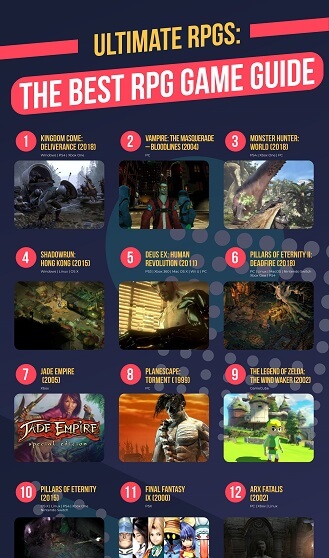
Level Up Your Adventure: A Comprehensive Guide to Conquering RPGs
Role-playing games (RPGs) have captivated players for decades, offering immersive worlds, compelling narratives, and the freedom to forge your own destiny. From sprawling open worlds to tightly woven character-driven stories, RPGs offer a unique blend of strategic combat, exploration, and personalized storytelling. But with their complex systems, intricate lore, and sheer volume of content, diving into a new RPG can feel daunting. This guide is designed to equip you with the knowledge and strategies you need to confidently navigate the vast and rewarding landscape of RPG gaming.
Understanding the Core Elements of RPGs
At their heart, RPGs are about embodying a character and making choices that shape their journey. While specific mechanics vary, certain core elements are common across the genre:
-
Character Creation and Customization: The foundation of any RPG experience is crafting your character. This often involves choosing a race (human, elf, dwarf, etc.), a class (warrior, mage, rogue, etc.), and allocating attribute points to determine your character’s strengths and weaknesses. Further customization may include appearance, skills, and even a backstory. Understanding how these choices impact your gameplay is crucial for building a character suited to your playstyle.
-
Stats and Attributes: Your character’s abilities are governed by a complex web of statistics and attributes. Strength might determine your melee damage, dexterity your agility and accuracy, intelligence your magical power, and so on. Understanding these stats and how they interact with skills and equipment is key to optimizing your character’s performance.
-
Skills and Abilities: Beyond basic attributes, characters often possess a range of skills and abilities that define their combat prowess, utility, and social interactions. These might include weapon proficiency, spellcasting, crafting skills, or even the ability to persuade NPCs. Investing in the right skills can dramatically impact your effectiveness in various situations.
-
Equipment and Inventory Management: Gear plays a vital role in enhancing your character’s capabilities. Weapons, armor, accessories, and consumable items all contribute to your stats, provide special effects, and define your character’s look. Managing your inventory efficiently and strategically equipping your character is crucial for survival and success.
-
Quests and Storylines: RPGs are driven by quests, which provide goals, challenges, and rewards. Main quests advance the overarching narrative, while side quests offer opportunities for exploration, character development, and resource gathering. Paying attention to quest objectives and dialogue is essential for progressing through the game.
-
Combat Systems: Combat is a central element of most RPGs, ranging from turn-based strategic battles to real-time action-oriented encounters. Understanding the mechanics of the combat system, including attack patterns, enemy weaknesses, and tactical options, is essential for overcoming challenges.
-
Dialogue and Choices: Interacting with Non-Player Characters (NPCs) is a cornerstone of RPG gameplay. Dialogue options allow you to gather information, influence relationships, and make choices that shape the story and your character’s reputation.
-
Experience Points (XP) and Leveling Up: Completing quests, defeating enemies, and achieving milestones earn you experience points. Accumulating enough XP allows you to level up, increasing your stats, unlocking new skills, and becoming more powerful.
Choosing the Right RPG for You
The RPG genre is incredibly diverse, catering to a wide range of preferences. Here’s a breakdown of some popular subgenres:
-
Fantasy RPGs: These games are set in fantastical worlds filled with magic, mythical creatures, and medieval-inspired settings. Examples include The Elder Scrolls V: Skyrim, The Witcher 3: Wild Hunt, and Dragon Age: Inquisition.
-
Sci-Fi RPGs: These games explore futuristic settings, often involving space exploration, advanced technology, and alien civilizations. Examples include Mass Effect Legendary Edition, Fallout 4, and Cyberpunk 2077.
-
Action RPGs (ARPGs): These games emphasize fast-paced combat and loot collection, often with a focus on character builds and endgame content. Examples include Diablo IV, Path of Exile, and Grim Dawn.
-
Turn-Based RPGs: These games feature strategic combat where players take turns issuing commands to their characters. Examples include Divinity: Original Sin 2, Persona 5 Royal, and Baldur’s Gate 3.
-
MMORPGs (Massively Multiplayer Online RPGs): These games allow thousands of players to interact in a shared online world, completing quests, battling monsters, and forming alliances. Examples include World of Warcraft, Final Fantasy XIV, and The Elder Scrolls Online.
When choosing an RPG, consider your preferred setting, combat style, and level of complexity. Researching reviews and watching gameplay videos can help you determine if a particular game is a good fit for your taste.
Tips and Strategies for Success
Once you’ve chosen your RPG, here are some tips and strategies to help you thrive:
-
Read the Tutorials: Don’t skip the tutorials! They provide essential information about the game’s mechanics, combat system, and user interface. Understanding these basics will save you a lot of frustration later on.
-
Experiment with Character Builds: Don’t be afraid to experiment with different character builds and skill combinations. Try out different classes, races, and skill trees to find a playstyle that suits you.
-
Explore Thoroughly: RPGs often reward exploration with hidden treasures, secret quests, and valuable resources. Take your time to explore the environment and uncover its secrets.
-
Talk to Everyone: Talk to every NPC you encounter. They may offer quests, provide valuable information, or simply add to the game’s atmosphere.
-
Manage Your Inventory Wisely: Inventory management is crucial in most RPGs. Organize your items, sell unwanted gear, and prioritize essential supplies like potions and healing items.
-
Utilize Crafting Systems: Many RPGs feature crafting systems that allow you to create weapons, armor, potions, and other useful items. Learn the crafting recipes and gather the necessary materials to enhance your gear.
-
Take Advantage of Weaknesses: Learn the weaknesses of different enemy types and exploit them in combat. Use elemental attacks, status effects, and tactical maneuvers to gain an advantage.
-
Don’t Be Afraid to Grind: Sometimes, you may need to grind for experience points or resources to overcome a challenging encounter. Find a good farming spot and level up your character before tackling difficult content.
-
Save Frequently: Save your game frequently, especially before entering dangerous areas or making important decisions. This will prevent you from losing progress if you die or make a mistake.
-
Join the Community: Connect with other players online through forums, social media groups, and Discord servers. Share tips, ask questions, and learn from experienced players.
-
Don’t Give Up: RPGs can be challenging, but they are also incredibly rewarding. Don’t give up if you encounter a difficult obstacle. Persevere, learn from your mistakes, and keep exploring the world.
Beyond the Basics: Mastering the RPG Experience
Once you’ve grasped the fundamentals, you can delve deeper into the nuances of RPG gameplay:
-
Optimizing Character Builds: Experiment with advanced character builds that synergize specific skills, equipment, and stats to maximize your character’s potential.
-
Min-Maxing: This involves optimizing every aspect of your character’s build, from stat allocation to equipment choices, to achieve the highest possible performance.
-
Speedrunning: This involves completing the game as quickly as possible, often using glitches and exploits to bypass sections and skip cutscenes.
-
Roleplaying: Immerse yourself in the role of your character and make decisions based on their personality, values, and motivations.
-
Modding: Many RPGs have active modding communities that create new content, enhance graphics, and add new features to the game.
Conclusion
RPGs offer a vast and rewarding gaming experience, allowing you to create your own story, explore fantastical worlds, and forge lasting connections with memorable characters. By understanding the core elements of RPGs, choosing the right game for your preferences, and applying the tips and strategies outlined in this guide, you can confidently embark on your own epic adventure and conquer the challenges that lie ahead. So grab your sword, ready your spells, and prepare to level up your RPG experience! The world awaits.

